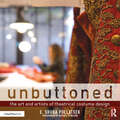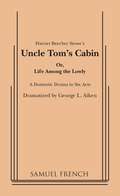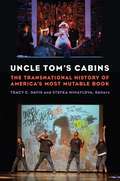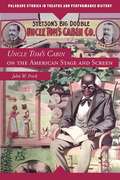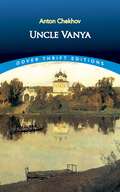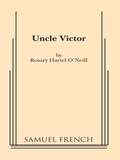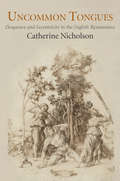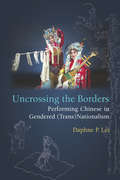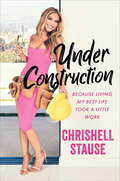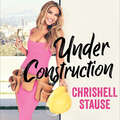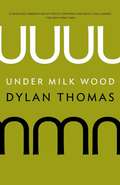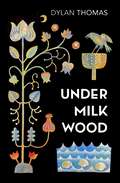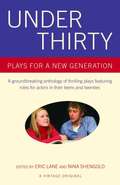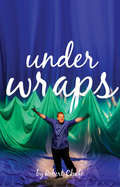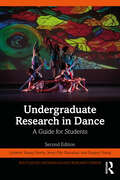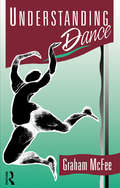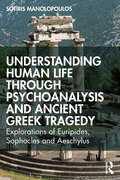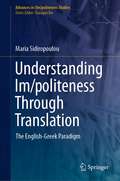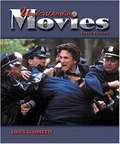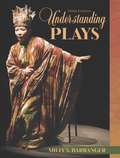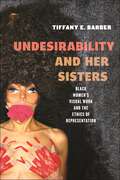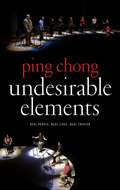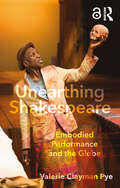- Table View
- List View
Unbuttoned: The Art and Artists of Theatrical Costume Design
by Shura PollatsekUnbuttoned: The Art and Artists of Theatrical Costume Design documents the creative journey of costume creation from concept to performance. Each chapter provides an overview of the process, including designing and shopping; draping, cutting, dyeing, and painting; and beading, sewing, and creating embellishments and accessories. This book features interviews with practitioners from Broadway and regional theatres to opera and ballet companies, offering valuable insights into the costume design profession. Exceptional behind-the-scenes photography illustrates top costume designers and craftspeople at work, along with gorgeous costumes in progress.
Unbuttoned: The Art and Artists of Theatrical Costume Design
by Shura PollatsekUnbuttoned: The Art and Artists of Theatrical Costume Design documents the creative journey of costume creation from concept to performance. Each chapter provides an overview of the process, including designing and shopping; draping, cutting, dyeing, and painting; and beading, sewing, and creating embellishments and accessories. This book features interviews with practitioners from Broadway and regional theatres to opera and ballet companies, offering valuable insights into the costume design profession. Exceptional behind-the-scenes photography illustrates top costume designers and craftspeople at work, along with gorgeous costumes in progress.
Uncle Tom's Cabin: Or Life Among The Lowly (1899)
by Harriet Beecher StoweThis is the original six-act version which has been produced thousands of times by professional and amateur companies.
Uncle Tom's Cabins: The Transnational History of America's Most Mutable Book
by Tracy C Davis Stefka MihaylovaAs Harriet Beecher Stowe’s novel Uncle Tom’s Cabin traveled around the world, it was molded by the imaginations and needs of international audiences. For over 150 years it has been coopted for a dazzling array of causes far from what its author envisioned. This book tells thirteen variants of Uncle Tom’s journey, explicating the novel’s significance for Canadian abolitionists and the Liberian political elite that constituted the runaway characters’ landing points; nineteenth-century French theatergoers; liberal Cuban, Romanian, and Spanish intellectuals and social reformers; Dutch colonizers and Filipino nationalists in Southeast Asia; Eastern European Cold War communists; Muslim readers and spectators in the Middle East; Brazilian television audiences; and twentieth-century German holidaymakers. Throughout these encounters, Stowe’s story of American slavery serves as a paradigm for understanding oppression, selectively and strategically refracting the African American slave onto other iconic victims and freedom fighters. The book brings together performance historians, literary critics, and media theorists to demonstrate how the myriad cultural and political effects of Stowe’s enduring story has transformed it into a global metanarrative with national, regional, and local specificity.
Uncle Tom’s Cabin on the American Stage and Screen
by John W. FrickNo play in the history of the American stage has been as ubiquitous and as widely viewed as Uncle Tom's Cabin. This book traces the major dramatizations of Harriet Beecher Stowe's classic from its inception in 1852 through "modern" versions on film. Frick examines the major productions, companies, and influential persons in the long, complex history of theatrical Toms, providing a broad overview of what has been labeled the "Uncle Tom phenomenon. " Unlike previous studies about Uncle Tom's Cabin, Frick introduces the reader to the artists who created the plays and productions that created theatre history.
Uncle Vanya: Large Print (Dover Thrift Editions: Plays)
by Anton ChekhovThis structurally and psychologically compact drama takes place on an estate in 19th-century Russia, exploring the complex interrelationships between a retired professor, his second wife, and the daughter and brother-in-law from his first marriage. Interwoven themes of weakness, delusion, and despair are balanced by an underlying message of courage and hope.
Uncle Victor
by Rosary Hartel O'NeillFull Length, Historical Comedy Characters: 3 male, 4 female. Interior. Uncle Victor is a historical comedy inspired by the classic Russian play, Uncle Vanya, by Anton Chekhov. In this version O'Neill takes the structure of Uncle Vanya and some characters and places them on Waverly Plantation in 1899 Louisiana. While the dialogue and characters are typically Southern, the Louisiana story perfectly parallels the situation of turn-of-the century Russia, where a new urban economy was destroying the country's agrarian base. While Russians were suffering from typhoid and peasants were going hungry, Southerners were dying from yellow fever and displaced farmers were starving. In Uncle Victor, the Mallory family, running Waverly Sugar Plantation, confronts a totally changed Louisiana.. Also available in Ghosts of New Orleans.
Uncommon Tongues: Eloquence and Eccentricity in the English Renaissance
by Catherine NicholsonIn the late sixteenth century, as England began to assert its integrity as a nation and English its merit as a literate tongue, vernacular writing took a turn for the eccentric. Authors such as John Lyly, Edmund Spenser, and Christopher Marlowe loudly announced their ambitions for the mother tongue--but the extremity of their stylistic innovations yielded texts that seemed hardly English at all. Critics likened Lyly's hyperembellished prose to a bejeweled "Indian," complained that Spenser had "writ no language," and mocked Marlowe's blank verse as a "Turkish" concoction of "big-sounding sentences" and "termes Italianate. " In its most sophisticated literary guises, the much-vaunted common tongue suddenly appeared quite foreign. In Uncommon Tongues, Catherine Nicholson locates strangeness at the paradoxical heart of sixteenth-century vernacular culture. Torn between two rival conceptions of eloquence, savvy writers and teachers labored to reconcile their country's need for a consistent, accessible mother tongue with the expectation that poetic language depart from everyday speech. That struggle, waged by pedagogical theorists and rhetoricians as well as authors we now recognize as some of the most accomplished and significant in English literary history, produced works that made the vernacular's oddities, constraints, and defects synonymous with its virtues. Such willful eccentricity, Nicholson argues, came to be seen as both the essence and antithesis of English eloquence.
Uncrossing the Borders: Performing Chinese in Gendered (Trans)Nationalism
by Daphne LeiOver many centuries, women on the Chinese stage committed suicide in beautiful and pathetic ways just before crossing the border for an interracial marriage. Uncrossing the Borders asks why this theatrical trope has remained so powerful and attractive. The book analyzes how national, cultural, and ethnic borders are inevitably gendered and incite violence against women in the name of the nation. The book surveys two millennia of historical, literary, dramatic texts, and sociopolitical references to reveal that this type of drama was especially popular when China was under foreign rule, such as in the Yuan (Mongol) and Qing (Manchu) dynasties, and when Chinese male literati felt desperate about their economic and political future, due to the dysfunctional imperial examination system. Daphne P. Lei covers border-crossing Chinese drama in major theatrical genres such as zaju and chuanqi, regional drama such as jingju (Beijing opera) and yueju (Cantonese opera), and modernized operatic and musical forms of such stories today.
Under Construction: Because Living My Best Life Took a Little Work
by Chrishell StauseA heartfelt, humorous personal memoir and relatable guide to overcoming obstacles, wising up about romance, and getting ahead in your career from the star of Netflix's hit reality show Selling Sunset.In this engaging, witty, and inspirational memoir, Chrishell Stause shares her story of living an unconventional childhood in small-town Kentucky marked by periods of homelessness, family addiction struggles and dreams of one day being on a daytime soap, all while managing the local Dairy Queen. Through resilience and grit, she overcame obstacles and pushed past every barrier in her path to become one of the most envied luxury realtors in Los Angeles and buzzworthy cast members in reality TV.She takes us behind the scenes of Selling Sunset, reveals never-before-told stories from her life in soaps, and even pulls back the curtain on her highly publicised love life, offering insight not before shared. With her signature honesty and charm, Stause also gives tangible advice based on the lessons she's learned over the years and offers unique insight about how to stay resilient and positive no matter how many times life knocks you down. Under Construction is for anyone who wants to remember that no matter what happens or how, you have to get up, dress up and show up - and walk back into the room stronger than ever before.
Under Construction: Because Living My Best Life Took a Little Work
by Chrishell StauseA heartfelt, humorous personal memoir and relatable guide to overcoming obstacles, wising up about romance, and getting ahead in your career from the star of Netflix's hit reality show Selling Sunset.In this engaging, witty, and inspirational memoir, Chrishell Stause shares her story of living an unconventional childhood in small-town Kentucky marked by periods of homelessness, family addiction struggles and dreams of one day being on a daytime soap, all while managing the local Dairy Queen. Through resilience and grit, she overcame obstacles and pushed past every barrier in her path to become one of the most envied luxury realtors in Los Angeles and buzzworthy cast members in reality TV.She takes us behind the scenes of Selling Sunset, reveals never-before-told stories from her life in soaps, and even pulls back the curtain on her highly publicised love life, offering insight not before shared. With her signature honesty and charm, Stause also gives tangible advice based on the lessons she's learned over the years and offers unique insight about how to stay resilient and positive no matter how many times life knocks you down. Under Construction is for anyone who wants to remember that no matter what happens or how, you have to get up, dress up and show up - and walk back into the room stronger than ever before.
Under Milk Wood
by Dylan ThomasThe definitive new edition of Thomas's famous radio play Under Milk Wood is the masterpiece "radio play for voices" Dylan Thomas finished just before his death in 1953. First commissioned by the BBC and broadcast in 1954, it has been performed and celebrated by Anthony Hopkins, Richard Burton, Elton John, Tom Jones, Catherine Zeta Jones, Elizabeth Taylor, Peter O'Toole, and many others. In Under Milk Wood, Thomas gave fullest expression to his sense of the magnificent flavor and variety of life. A moving and hilarious account of a spring day in a small Welsh town, the play begins with dreams and ghosts before dawn and closes "as the rain of dusk brings on the bawdy night." This new edition contains the definitive version of the play, edited by the noted Dylan Thomas scholars Walford Davies and Ralph Maud, with an in-depth introduction by Davies as well as extensive and helpful textual and explanatory notes.
Under Milk Wood: A Play for Voices
by Dylan Thomas'It is spring, moonless night in the small town, starless and bible-black...'Under Milk Wood tells the story of a Welsh village during one spring day. It is populated by some of the best-loved characters in British literature. Lyrical, funny, moving, it is rooted in place but with a universality that has spoken to generations of readers. A Welsh epic, a work of poetic genius, a modern classic.'A tour de force of oral poetry which oozes word pictures and onomatopoeic musicality' Guardian
Under Thirty: Plays for a New Generation
by Eric Lane Nina ShengoldFor the vast generation of actors in their teens and twenties, as well as for teachers, directors, and producers, Under Thirty is an unparalleled source of diverse and challenging roles, created by some of today's finest writers. The twenty plays presented here in full or in part include insightful looks at the pressure-cooker caste system of American high schools as well as heartbreaking, edgy portrayals of twentysomethings adrift in the city. There are snappy romantic duets, large-cast ensembles, and everything in between, populated by richly dimensional, mold-breaking characters: misfit cheerleaders, nurturing drifters, rich petty thieves--even a rogue SAT tutor. The contributing playwrights span the range of contemporary talent, including award-winning dramatists such as Sam Shepard, Donald Margulies, Warren Leight, and Kenneth Lonergan, hilarious humorists such as David Ives and Douglas Carter Beane, and an impressive array of cutting-edge newer voices. From the Trade Paperback edition.
Under Wraps
by Robert ChafeThe moment Mark meets David his world is thrown off balance. Who could have predicted finding love in a furniture store, or finding it with an unemployed lifeguard? But despite their immediate connection, Mark isn’t sure if David is gay. Mark isn’t even sure if Mark is gay. As he falls deeper in love, Mark works desperately to make David nothing more than a friend and to make that enough. Filled with hopeful exhilaration and devastating missed opportunities, Under Wraps nimbly tracks one man’s tumultuous quest to finally love himself and let it all out.
Undergraduate Research in Dance: A Guide for Students (Routledge Undergraduate Research Series)
by Jenny Olin Shanahan Gregory Young Lynnette Young OverbyUndergraduate Research in Dance: A Guide for Students supplies tools for scaffolding research skills, alongside examples of undergraduate research in dance scholarship. This second edition has been updated throughout for current students, with new chapters on mentoring and dance studies.Dance can be studied as an expressive embodied art form with physical, cognitive, and affective domains, and as an integral part of society, history, and vast areas of interdisciplinary content. To this end, the guidance provided by this book will equip future dance professionals with the means to move the field of dance forward. Chapters 1–9 guide students through the fundamentals of research methods, providing a foundation to help students get started in understanding research protocols and processes. A new chapter 10 provides guidelines for mentoring undergraduate students in dance. Chapters 11–21 detail forms of undergraduate research in a rich diversity of fields within dance that are taught in many collegiate dance programs including dance therapy, history, science, psychology, education, and technology, in addition to public scholarship, choreography, and interdisciplinary topics. A new chapter on dance studies has been added to this second edition. The book also includes annotated online resources, and many of its chapters are supported by examples of abstracts of capstone projects, senior theses, and conference presentations by undergraduate researchers across the United States and globally.Suitable for both professors and students, this book is an ideal reference book for dance studies as well as humanities and arts courses intersecting with dance.
Understanding Dance: Identity, Performance And Understanding
by Graham McFeeUnderstanding Dance is a comprehensive introduction to the aestethetics of dance, and will be an essential text for all those interested in dance as an object of study. Focusing on the work of a number of major choreographers, companies and critics Graham McFee explores the nature of our understanding of Dance by considering the practice of understanding dance-works themselves. He concludes with a validation of the place of dance in society and in education. Troughout he provides detailed insights into the nature and appreciation of art as well as a general grouding in philosophy.
Understanding Human Life through Psychoanalysis and Ancient Greek Tragedy: Explorations of Euripides, Sophocles and Aeschylus
by Sotiris ManolopoulosDrawing parallels between ancient theatre, the analytic setting, and the workings of psychic life, this book examines the tragedies of Euripides, Sophocles, and Aeschylus through a psychoanalytic lens, with a view of furthering the reader’s understanding of primitive mental states.What lessons can we learn from the tragic poets about psychic life? What can we learn about psychoanalytic work from ancient tragedy and playwrights? Sotiris Manolopolous considers how the key tenets of ancient Greek theatre – passion, conflict, trauma, and tragedy – were focussed on because they could not be spoken of in daily life and how these restraints have continued into contemporary life. Throughout, he considers how theatre can be used to stage political experiences and shows how these experiences are a vital part of understanding an analysand within an analytic setting. Drawing on his own clinical practice, Manolopoulos considers what ancient playwrights might teach us about early, uncontained agonies of annihilation and primitive mental states that manifest themselves both within the individual and the collective experience of contemporary life, such as climate change denial and totalitarian politicians.Drawing on canonical works such as Hippolytus, Orestes, Antigone, and Prometheus Unbound, this book continues the legacy of research that shows how contemporary analysts, students, and scholars can learn from ancient Greek literature and apply it directly to those negatively impacted by the trauma of 21st-century life and politics.
Understanding Im/politeness Through Translation: The English-Greek Paradigm (Advances in (Im)politeness Studies)
by Maria SidiropoulouThis book offers a unique window to the study of im/politeness by looking at a translation perspective, which offers a different set of data and allows further understanding of the phenomenon. In the arena of real-life translation practice, the workings of im/politeness are renegotiated in a different cultural context and thus pragmatically oriented cross-cultural differences become more concrete and tangible. The book focuses on the language pair English and Greek, a strategic choice with Greek as a less widely spoken language and English as a global language. The two languages also differ in their politeness orientation in certain genres, which allows for a fruitful comparison. The volume focuses on press translation first, then translation of academic texts and translation for the stage, and finally audiovisual translation (mainly subtitles). These genres highlight a public, an interactional, and a multimodal dimension in the workings of im/politeness.
Understanding Movies
by Louis D. GiannettiHelps readers understand how the many languages of film work together to create meaning. Louis Giannetti organizes "Understanding Movies" around the key elements of filmmaking, including cintematography, Mise en Scene, movement, editing, sound, acting, drama, casting, story, screenwriting, ideology, and theory. He synthesizes every element through a complete case study: "Citizen Kane," This book's ideas are illuminated with hundreds of high-quality still photos, more than 70 in full color, taken from movies such as "The Matrix, Almost Famous, jackass the movie, Chicago, Lord of the Rings, Mystic River, and Traffic. New in this edition: a full section on contemporary special effects and computer generated imagery (CGI); up-to-the-minute information on new developments in film technology; more coverage of recent films and filmmakers; more ethnic diversity (including new material on the Islamic cinema); and more lavish use of color and high-quality paper. An updated Companion Website contains animations, video clips from interviews with movie professionals, and Research Navigator access to "New York Times"" film reviews. For everyone who wants to understand the artistry and meaning of the movies.
Understanding Plays
by Milly S. BarrangerA textbook for a one-semester course in theater or literature. Along with scripts of 16 plays from classical Greek to modern, are commentaries by playwrights, directors, scholars, and critics. Earlier editions appeared in 1990 and 1994; the third includes new plays and commentary. Also, offers seventeen plays with critical commentaries that span the range of Western writing for the theatre from the Greeks to the post-moderns. This book introduces readers to dramatic writing as ?pre-texts? for theatrical performance?written not only to be read, but also to be performed by actors before audiences.
Undesirability and Her Sisters: Black Women's Visual Work and the Ethics of Representation (Minoritarian Aesthetics)
by Tiffany E. BarberHow Black women’s visual work functions in an era of new racial and gender meaningIn the wake of contemporary art’s post-Black turn and the mainstreaming of intersectionality, Undesirability and Her Sisters charts a new genealogy of Black women’s art that exposes the unfinished project of racial and gender empowerment in the twenty-first century. Tiffany Barber argues that Black women’s social positions at the intersection of race, gender, sexuality, and class are inherently queer, thus spurring unexpected aesthetic strategies that throw into high relief the ethical terrain of what it means to be Black and a woman now.Undesirability and Her Sisters collates what Barber terms “undesirable” representations of Black female bodies in recent American sculpture, collage, photography, and dance-based performance art by Kara Walker, Wangechi Mutu, Xaviera Simmons, and Narcissister. These works not only engage the visual senses but also incorporate olfactory, haptic, and sonic experiences that challenge traditional interpretations of Blackness and womanhood in art history, Black Studies, feminist and gender studies, dance and performance studies, and queer studies. Instead of transcendental beauty, wholeness, and individual and collective becoming, the perverse Black female figures profiled here eschew sublimation and synthesis as necessary responses to racial and gender subjugation in the past, present, and future.Through its unique, groundbreaking analysis, this book contributes to the ongoing discussions on the ethics of representation—the capacity to speak and act for oneself, to have significance and impact, and ultimately, to reject acknowledgment.
Undesirable Elements
by Alisa Solomon Ping Chong"The cumulative power of these shared stories is nothing short of astonishing. Ping Chong creates a tremendous tapestry of lives."--Twin Cities Reader This three-piece volume of Undesirable Elements, the community-specific theater works series, examines the lives of those born into one culture but living in another. Each production grows out of an extended residency, during which Ping Chong and his collaborators conduct interviews of community members and then create a script that explores both historical and personal narratives. Ping Chong is a theater director, playwright, choreographer, and video and installation artist. The recipient of two OBIE awards, two Bessie awards, and a Guggenheim Fellowship, he has created more than fifty works for the stage, including twenty-five in his Undesirable Elements series.
Unearthing Shakespeare: Embodied Performance and the Globe
by Valerie Clayman PyeWhat can the Globe Theatre tell us about performing Shakespeare? Unearthing Shakespeare is the first book to consider what the Globe, today’s replica of Shakespeare’s theatre, can contribute to a practical understanding of Shakespeare’s plays. Valerie Clayman Pye reconsiders the material evidence of Early Modern theatre-making, presenting clear, accessible discussions of historical theatre practice; stages and staging; and the relationship between actor and audience. She relays this into a series of training exercises for actors at all levels. From "Shakesball" and "Telescoping" to Elliptical Energy Training and The Radiating Box, this is a rich set of resources for anyone looking to tackle Shakespeare with authenticity and confidence.
